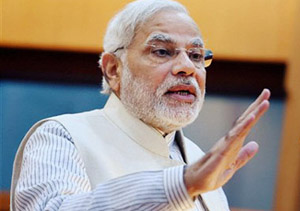Guwahati, Nov 30: Focusing on security issues in Assam, Prime Minister Narendra Modi today said his government will go ahead with the land swapping agreement with Bangladesh for a permanent solution to the infiltration problem.
"I know Assam's problems. I assure you all that there will be no compromise on Assam's security. Land swapping will be done for a permanent solution," he told a BJP workers' meeting here.
"I know the sentiment of Assamese people regarding land swapping deal. I assure you, we will move ahead considering the country's and Assam's welfare. Assam will gain in long term even if it looks like losing in short term," he said.
The government will close all roads to the forces, who are destroying the state "on a daily basis" and the law will take its own course to punish them, he said, adding, everything will be done for development and job generation in the North East.
Referring to the ambitious Jan Dhan Yojna, the prime minister said, "BJP is working to bring the poor to the mainstream. The poor had never entered the banks (before). We have opened bank doors for them.
"The PSU banks are working very hard now. Every week, one crore bank accounts are being opened. Earlier, one crore accounts were opened not even in one month, but in one year."
He said BJP has for the first time fought elections on the single issue of development and forced other parties to consider this issue prominently.
"BJP government has only one motto and it is development. No party had the courage to fight elections on the development issue. In Maharashtra, Haryana and now in Jharkhand, all parties are talking about development," he said.
Modi said the people have seen almost all parties, including those run by families, in government and are now seeing the BJP rule at the centre.
"BJP doesn't do politics on the basis of casteism, communalism or regionalism. We don't accept that road. BJP always did politics of nationalism. We believe in development with all and for all," he added.






Comments
Add new comment